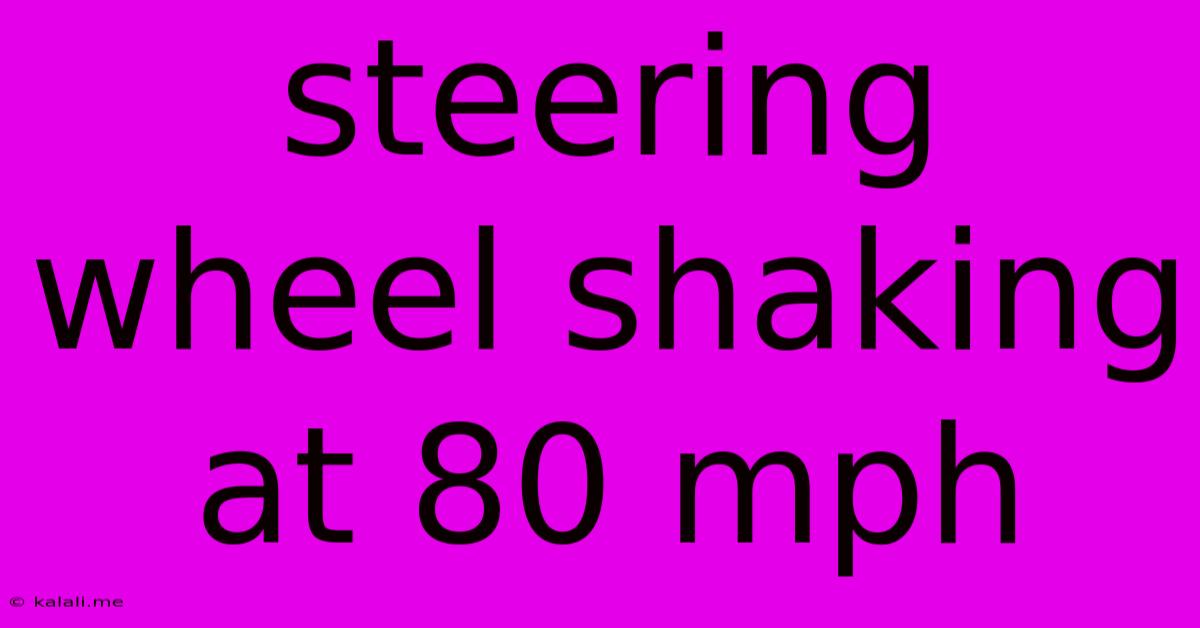Steering Wheel Shaking At 80 Mph
Kalali
Jun 02, 2025 · 3 min read

Table of Contents
Steering Wheel Shaking at 80 mph: Causes and Solutions
Meta Description: Experiencing a steering wheel shake at 80 mph? This comprehensive guide explores common causes, from tire issues to suspension problems, and offers solutions to restore smooth driving.
A steering wheel shaking at 80 mph is a serious issue that demands immediate attention. It not only compromises your comfort but also significantly impacts safety, potentially leading to loss of control. This unsettling vibration can stem from a variety of problems, ranging from simple fixes to more complex mechanical issues. Let's delve into the most common culprits and how to address them.
Common Causes of Steering Wheel Shake at High Speeds
Several factors can contribute to a vibrating steering wheel, especially at higher speeds like 80 mph. Identifying the root cause is crucial for a safe and effective repair.
1. Tire Problems: This is often the most frequent offender.
- Tire Balance: An imbalance in your tires is a very common cause. Uneven weight distribution causes the tire to wobble, translating the vibration up through the steering column. This is particularly noticeable at higher speeds.
- Tire Wear: Uneven or excessive tire wear, such as cupping or feathering, can also contribute to vibrations. Worn tires lose their ability to grip the road evenly, resulting in a shaking sensation.
- Bent Rims: A bent or damaged rim can severely disrupt tire balance and cause significant vibrations. Impact damage, like hitting a pothole, is a common cause.
- Tire Pressure: Incorrect tire pressure can affect the handling and stability of your vehicle, potentially leading to a shaking steering wheel. Always maintain the recommended tire pressure as specified in your owner's manual.
2. Suspension System Issues: Problems within the suspension system can also transmit vibrations to the steering wheel.
- Worn-out Shocks or Struts: These components absorb impacts and bumps, and their deterioration can lead to excessive bouncing and vibrations.
- Ball Joints: Worn ball joints connect the steering knuckles to the control arms and their failure can impact steering stability and cause vibrations.
- Tie Rod Ends: These components connect the steering rack to the wheels and play a vital role in steering precision. Damage or wear can affect handling and cause shaking.
3. Other Potential Causes: While less common, these factors shouldn't be ruled out.
- Brake Rotor Warpage: Warped brake rotors can cause vibrations, especially when braking at high speeds. This is often felt in the steering wheel and brake pedal.
- Driveshaft Issues: Problems with the driveshaft, such as imbalance or worn universal joints, can transmit vibrations throughout the vehicle, including the steering wheel.
- Wheel Bearings: Worn wheel bearings can create a humming or rumbling noise along with steering wheel vibrations, often accompanied by a noticeable play in the wheel.
Diagnosing and Fixing the Problem
Addressing a steering wheel shake requires a systematic approach:
- Visual Inspection: Begin with a thorough visual inspection of your tires, rims, and suspension components for any signs of damage or wear.
- Tire Rotation and Balance: Have your tires rotated and balanced by a professional. This is a relatively inexpensive and often effective first step.
- Suspension Check: A qualified mechanic can inspect your shocks, struts, ball joints, tie rod ends, and other suspension components for wear and tear.
- Brake Rotor Inspection: Check the brake rotors for any signs of warping.
- Professional Diagnosis: If the problem persists after addressing the above, take your vehicle to a trusted mechanic for a thorough diagnosis.
Ignoring a shaking steering wheel at high speeds is dangerous. Promptly addressing the underlying cause is crucial for your safety and the longevity of your vehicle. Remember, professional assistance is often the best approach to ensure accurate diagnosis and effective repair.
Latest Posts
Latest Posts
-
Can You Be Evil If You Follow Kants Principals
Jun 04, 2025
-
Why Is There No Roast Beef In Store
Jun 04, 2025
-
How To Stop A Cat From Scratching A Door
Jun 04, 2025
-
Fallout 4 Do Companions Need Ammo
Jun 04, 2025
-
How Many Times Is Jesus Mentioned In The Bible
Jun 04, 2025
Related Post
Thank you for visiting our website which covers about Steering Wheel Shaking At 80 Mph . We hope the information provided has been useful to you. Feel free to contact us if you have any questions or need further assistance. See you next time and don't miss to bookmark.